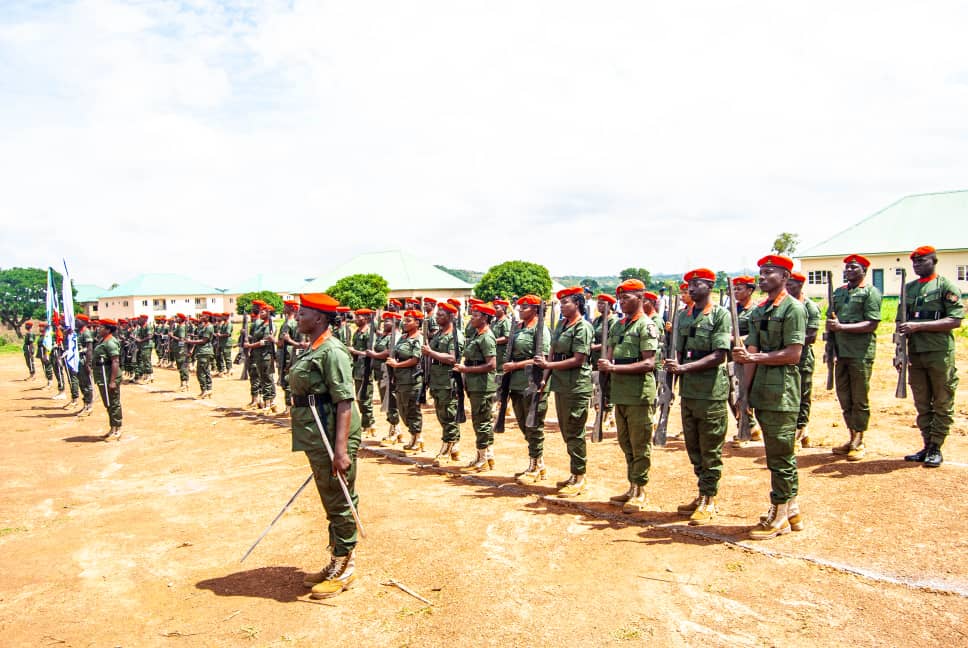From Christiana Gokyo, Jos
The Nigeria Security and Civil Defence Corps (NSCDC) has graduated 150 personnel from its Agro-Rangers Course SH 1314 at the Command and Staff College, Jos, Plateau State, as part of efforts to address the rising farmer-herder conflicts and improve food security nationwide.
The passing-out parade, held on Tuesday at the Command and Staff College in Naton-Fursa, Jos East Local Government Area, attracted key government officials, including the Plateau State Governor, Caleb Manasseh Mutfwang, who reaffirmed the state’s commitment to agricultural security and peacebuilding.
“Our farms are critical national assets that must not only be protected but cultivated to attain food security and food sovereignty,” Governor Mutfwang said during his address. “These Agro-Rangers have been trained to ensure that farmers can go to farm and return home safely and that the fruits of their labour are not destroyed.”
He said the deployment of Agro-Rangers alongside other security forces would strengthen internal security, ensure peaceful coexistence between farmers and herders, and prevent localized conflicts from escalating into national crises.
“I charge those graduating today to be committed to duty. Go about your responsibility with justice and fairness. You have taken on a task that no amount of money can compensate. What you have been called to do is sacrifice—for your brothers and sisters, for your parents, for our common good, for our future,” the governor told the graduating officers.
Governor Mutfwang reiterated his administration’s unwavering commitment to peace, unity, and inclusive development, stressing that the safety of farmers was essential to achieving national food sufficiency.
He expressed appreciation to President Bola Ahmed Tinubu for his continued support and also lauded Nigeria’s security chiefs for their collaborative approach in tackling insecurity across Plateau and the country at large.
The governor also singled out the NSCDC’s Agro-Rangers initiative as a timely innovation that complements conventional security efforts in rural areas.
“While our security forces continue to uphold the sovereignty and internal stability of the country, the Agro-Rangers initiative by the NSCDC is a commendable response to the unique security needs of our agrarian communities,” he said.
Governor Mutfwang disclosed that the Agro-Rangers, in collaboration with other security agencies, recently oversaw the peaceful evacuation of thousands of stranded cattle from Bokkos Local Government Area without incident—a testament to their professionalism and non-violent conflict resolution skills.
Earlier, the Commandant-General of the NSCDC, Dr. Ahmed Abubakar Audi, noted that this was the second batch of Agro-Rangers trained and deployed to Plateau State.
“The Agro-Rangers are specially trained to provide security cover for farmers. We are proud to be partners in the journey toward sustainable peace and food security,” Audi said. “We are committed to expanding their operations across the country in collaboration with other security agencies.”
Dr. Audi described the farmer-herder crisis as an “asymmetric conflict” that requires coordinated, innovative, and multifaceted responses, rather than conventional military tactics.
“This conflict resembles a guerrilla type of warfare where the bad actors strike soft targets and retreat. Their impact is devastating—not just on human lives but on critical assets. No single agency can handle this alone. We must cooperate, collaborate, and coordinate effectively,” he stated.
He added that the NSCDC remains committed to providing protection for farmers and ensuring security in agrarian communities, noting that the Corps is focused on working alongside sister agencies under the “three Cs” approach—cooperation, collaboration, and coordination.
Also speaking, the Commandant of the NSCDC Command and Staff College, Jos, Assistant Commandant General D.A. Abi, described the Agro-Rangers protection training as a vital initiative endorsed by the Minister of Interior.
According to him, the six-week intensive training was conducted in partnership with the Plateau State Government and exposed participants to a wide range of theoretical and practical modules, including simulations of real-life security situations.
“This programme is designed to protect our nation’s agricultural resources and infrastructure,” Abi said. “The rigorous training has equipped these officers to act swiftly, responsibly, and professionally in the field.”
Dr. Audi had earlier paid a courtesy visit to Governor Mutfwang at his residence in Jos, where they discussed further strategies for improving security in Plateau, particularly in rural and conflict-prone communities.
The Agro-Rangers scheme was established by the NSCDC to mediate and manage conflicts between farmers and herders, provide security for agricultural infrastructure, and foster peaceful dialogue among stakeholders in the agricultural value chain.


